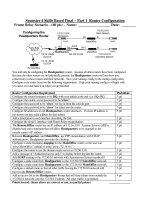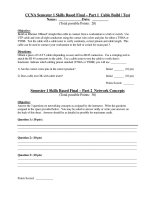CCNA Semester 3 - Skills Based Final Exam - Student Training Instructor Guidelines - Exam Overview and Administration
Bạn đang xem bản rút gọn của tài liệu. Xem và tải ngay bản đầy đủ của tài liệu tại đây (78.16 KB, 7 trang )
CCNA Semester 3 - Skills Based Final Exam - Student Training
Instructor Guidelines - Exam Overview and Administration
This exam is for use with regular CCNA classes taught by local academies to high school and college
students. The skills-based exam consists of three parts; 1) Router Configuration and 2)
Troubleshooting and 3) Network Concepts. All 3 parts should be completed (total possible of 100
points) and the total score combined with the Semester 3 online assessment exam to establish a
course grade. Scores from chapter exams and completion of labs, as well as points for participation
and attendance may also count toward the final grade.
The guidelines presented here are recommendations and instructors have flexibility in assigning point
values and administering the exam based on their classroom environment and schedule. Emphasis
should be on the hands-on portion of the exam. Students should be made aware of what they will be
tested on early in the course in order to study and prepare adequately for the exam.
The exam may be administered by dividing the class into groups (teams) of four. Try to ensure that
teams are evenly matched with a variety of skill levels. Teams should be formed about 2/3 of the
way through the class to allow them time to work together and to minimize team dropout. Hand out
page one (only) of exam Part 1 from the exam copy when teams are formed to allow adequate
preparation for the exam. Part 1 will require access to one router per student. Four students can be
tested simultaneously on Parts 1 and 2 (if 6 routers are available) while another group is working on
Part 3 Network Concepts portion of the exam.
Exam Part 1 – Router Configuration – (Practical hands-on, Max. time 40 min., 60 Points)
Objective: Manually configure a router and an attached workstation for a school network with a
WAN connection to the district office. The district office router is already configured and the IP
addresses are given. The network subnet mask and the host range for an assigned subnet must be
determined and an Access Control List (ACL) must be applied to block certain traffic from the school
to the district office. Each student will configure one router and an attached workstation.
Preparation / Tools: Standard 5-router / workstation lab setup plus one additional router if available.
If 6 routers are available, 4 students can be tested simultaneously. If 5 routers are available, 3
students can be tested simultaneously. Workstations should have HyperTerminal and a TFTP server
installed. Backups of the configuration files for all 5 (or 6) routers on floppy or CD should be
available for quick restore. The configuration of the district office routers; DO1 and DO2 are
included at the end of these guidelines.
CCNA Semester 3 - Skills Based Final Exam - Student Training
Instructor Guidelines - Exam Overview and Administration – Cont.
Exam Part 2 - Troubleshooting – (Practical hands-on, Max. time 20 min., 20 Points.)
Objective: Troubleshoot problems after the workstation and router have been configured. After the
workstation and router are successfully configured, the individual will be asked to leave and
problems will be introduced to demonstrate troubleshooting skills. Problems encountered during
troubleshooting and the steps taken to correct them must be documented. Each student will have to
troubleshoot the workstation and the router they configured.
Preparation / Tools: Develop a list of 5 to 10 potential problems to be introduced. Problems should
focus on OSI layers 3 and 4 resulting in loss of network connectivity or causing the ACL not to
function correctly. Examples include: 1) Change workstation IP settings, 2) Change router IP /
interface configuration, 3) Change the ACL statements, 4) Change the interface or remove the ACL
from an interface on the router. 5) Change the routing protocol used.
Exam Part 3 - Network Concepts – (Oral or Written, Est. time 20 min., 20 Points)
Objective: Answer 2 networking concepts questions from a pool of approved questions. Any student
may have to answer any question and should know the questions ahead of time. Responses may be
given verbally to the instructor / proctor or written depending on instructor and student preferences.
Preparation / Tools: List of questions and rubric which can be found in the instructor’s version of the
Semester 3 curriculum in the Preface, Chapter 0 under Third Semester Finals. A Rubric is provided
to help assess the accuracy and completeness of student’s answers.
Semester 3 Skills Based Final – Part 1 Router Configuration
Student Training
Name: ___________________Date: ______________
Exam Part 1 Overview:
You are the network administrator for a local elementary school. Your task is to setup and configure
the router for your particular location. You must configure the router from the command line of the
console interface using only IOS help. The district office routers, labeled DO1 and DO2, are already
configured and their setup is given below. The district has decided to create 1024 subnets from class
B network 171.17.0.0 to allow room for expansion. The district has also chosen to use IGRP for their
routing protocol and has been assigned autonomous system number 139 by the ICANN.
You will be assigned a Station Number for your school. This number is the same number as the
usable subnet you are assigned to. For example, if you are station number 10, you will be assigned
the 10
th
usable subnet range from your district’s network. This is illustrated in the diagram by the
letters SN and a number.
For security purposes, all of the student workstations will be given the upper half of the available
addresses in the host range of your school’s LAN. All of your major networking equipment (Routers,
switches, servers, printers etc.) and faculty stations will be given the lower half of the available
address within that same range. You will need to create and apply an access list that filters and
denies the student’s stations TELNET access to the closest serial interface on the district router.
District Router DO1 District Router DO2
Interface Serial 0 IP addr: 171.17.255.65 Interface Serial 0 IP addr: 171.17.254.193
Interface Serial 1 IP addr: 171.17.255.1 Interface Serial 1 IP addr: 171.17.254.129
Interface Ethernet 0 IP addr: 171.17.255.129 Interface Ethernet 0 IP addr: 171.17.255.130
Semester 3 Skills Based Final – Part 1 Router Configuration – Cont.
(Individual performance - 60 pts – 4 pts each)
School Router Configuration:
(Instructor or proctor must initial steps as completed)
1. Subnet Mask: ________255.255.255.192__ Initials: _______ Pts: _____
2. Host Range: See below for valid ranges Initials: _______ Pts: _____
Subnet /
Wkstn #
Valid IP Address Range Subnet /
Wkstn #
Valid IP Address Range
1 171.17.0.65 - 171.17.0.126 16 171.17.4.1 - 171.17.4.62
2 171.17.0.129 – 171.17.0.190 17 171.17.4.65 - 171.17.4.126
3 171.17.0.193 – 171.17.0.254 18 171.17.4.129 - 171.17.4.190
4 171.17.1.1 - 171.17.1.62 19 171.17.4.193 - 171.17.4.254
5 171.17.1.65 - 171.17.1.126 20 171.17.5.1 - 171.17.5.62
6 171.17.1.129 – 171.17.1.190 21 171.17.5.65 - 171.17.5.126
7 171.17.1.193 – 171.17.1.254 22 171.17.5.129 - 171.17.5.190
8 171.17.2.1 - 171.17.2.62 23 171.17.5.193 - 171.17.5.254
9 171.17.2.65 - 171.17.2.126 24 171.17.6.1 - 171.17.6.62
10 171.17.2.129 – 171.17.2.190 25 171.17.6.65 - 171.17.6.126
11 171.17.2.193 – 171.17.2.254 26 171.17.6.129 - 171.17.6.190
12 171.17.3.1 - 171.17.3.62 27 171.17.6.193 - 171.17.6.254
13 171.17.3.65 - 171.17.3.126 28 171.17.7.1 - 171.17.7.62
14 171.17.3.129 – 171.17.3.190 29 171.17.7.65 - 171.17.7.126
15 171.17.3.193 – 171.17.3.254 30 171.17.7.129 - 171.17.7.190
3. School WAN Interface Address: See address ranges below Initials: _______ Pts: _______
If connected to
DO1
Valid IP address range If connected
to DO2
Valid IP address range
Interface S0: 171.17.255.66 –
171.17.255.126
Interface S0: 171.17.254.194 –
171.17.254.254
Interface S1: 171.17.255.2 –
171.17.255.62
Interface S1: 171.17.254.130 –
171.17.254.190
4. LAN Interface Address: (From assigned range above) Initials: _______ Pts: _______
5. Appropriate Routing Protocol Initials: _______ Pts: _______
6. Workstation Address: (From assigned range above) Initials: _______ Pts: _______
Connectivity:
7. Ping opposite district router’s ethernet interface. Initials: _______ Pts: _______
8. Telnet to district router from workstation Initials: _______ Pts: _______
9. Access district router using web browser. Initials: _______ Pts: _______
Semester 3 Skills Based Final – Part 1 Router Configuration – Cont.
Adding Security:
Create and apply an access list that denies the student’s workstations telnet access to the closest serial
interface of the district router you are attached to. For the first section you will need a Faculty IP
address and for the second you will need a Student IP address before attempting the tests.
10. Workstation Address: From lower half of assigned range Initials: ________ Pts: ________
11. Can access district router via a web browser. Initials: ________ Pts: ________
12. Can access district router’s serial interface via telnet. Initials: ________ Pts: ________
You must reconfigure your workstation to have a Student IP address before completing
the following steps.
13. Workstation Address: From upper half of assigned range Initials: ________ Pts: ________
14. Can access district router via web browser. Initials: ________ Pts: ________
15. Cannot access district router’s serial interface via telnet. Initials: ________ Pts: ________
Points Scored: _____________
Semester 3 Skills Based Final – Part 2 Troubleshooting
(Individual performance - 20 pts)
Objective:
After your workstation and router have been successfully configured, you will be asked to leave and
problems will be introduced into your PC and/or router to demonstrate troubleshooting skills.
Problems encountered during troubleshooting and the steps taken to correct them must be
documented. You will troubleshoot the workstation and router you configured during part 1 of the
exam.
Troubleshooting Activity Record – 10 Points each (use back if necessary)
Symptom / Cause Tests / Results Detailed Solutions Points









